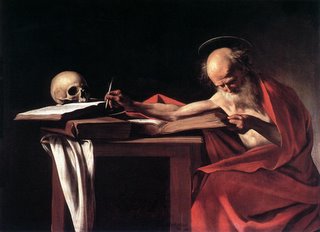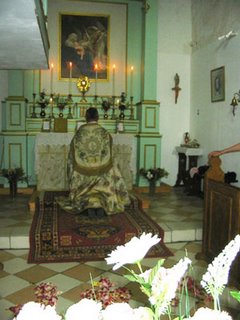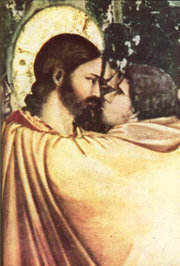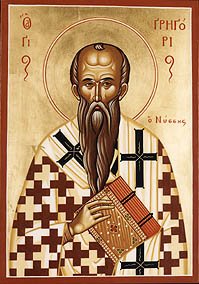
Ratzinger and Thermidor
In articles about Pope Benedict XVI, much has been made of his experience of student unrest at the University of Tübingen in 1968. Many see that experience as the best explanation of the apparent intellectual about-face that turned the young progressive theologian of the Second Vatican Council into the poster-child of conservative reaction in theology and in church politics. There is something to this, and Joseph Ratzinger was not the only European intellectual to have been deeply affected by the excesses of the fascists of the left at the time. (We all know the definition of a neoconservative: a liberal who’s been mugged.)
Thus begins Fr. Joseph Komonchak's new article in Commonweal. But the focus of the article is not so much on how much of a reactionary Joseph Ratzinger (now Pope Benedict XVI) has become, but how reactionary he has always been. While it is true that Fr. Ratzinger during the Council always wanted to "raze the bastions", as Hans Urs Van Balthasar was prone to say, his approach was different from the Chenus and Rahners of the world.
For Ratzinger, according to Komonchak, the "world" and the Church were always separate entities. The world was thus not to be trusted fully, thus his objections to Chenu's ideas in the first draft of Gaudium et Spes.
But did this make Ratzinger a reactionary? Not in the sense of the time. For Ratzinger, as I said above, still thought that the old Counter-Reformation pre-Vatican II theology was obsolete and needed something new to replace it. He has never disavowed the more ambiguous parts of Lumen Gentium, nor has even come close to admitting that the Council itself might be a mistake. As our present Pontiff now likes to say, the problem was never that he moved to the right. It's that everything else moved to the left so quickly.
A convincing argument. Fast forward to the address Benedict XVI gave this past December 22nd. (See this link) In it, Benedict concedes some suprising things, such as religious liberty not affecting the metaphysical aspect of the rights of the truth over error. But most of his arguement has to do with refuting a "hermeneutic of discontinuity" amongst some theologians:
Hermeneutics of discontinuity risk leading to a fracture between the pre-Council and post-Council Church. It asserts that the Council texts as such would still not be the true expression of the spirit of the Council. They would be the result of compromises within which, to reach unanimity, many old and ultimately useless things had to be dragged along and reconfirmed. It is, however, not in these compromises that the true spirit of the Council would be revealed, but instead in the drive toward newness that underpin the texts: only this would represent the true spirit of the Council, and starting from it and in conformity with it, it would be necessary to go forward. Precisely because the texts would reflect only imperfectly the true spirit of the Council and its novelty, it would be necessary to go courageously beyond the texts, making room for the new, in which the more profound, even though still indistinct, intention of the Council would express itself. In short: it would be necessary to follow not the Council texts, but its spirit. In this way, of course, a huge margin remains for the question of how then to define this spirit and, as a result, room is made for any whimsicality. With this, however, there is a basic misunderstanding of the nature of a Council as such. In this way, it is considered as a sort of a constituent assembly, that eliminates an old consitution and creates a new one. But a constituent assembly needs a mandator and them a confirmation on the part of the mandator, that is the people that the constitution must serve. The Council Fathers did not have such a mandate and no one had ever given one to them; furthermore, no one could have done so, because the Church's essential constitution comes from the Lord and has been given to us so that we can reach eternal life...
Note however, that he still admits that the text of the Council are fine, thus he has to have recourse to the adjective "beyond" when refering to the Conciliar texts themselves. The Council is still his baby. There is a problem yes, but it can't be his child's fault. The Revolution is fine, yes, but it has to be done right.
The French Revolution took a decisively "right-wing turn" on 9 Thermidor, 1794, when Robespierre and the Jacobins were overthrown by the more right-wing and conciliatory branch of the bourgeosie. This, however, was not a return to the ancien regime, and in some ways, the Revolution could only really continue by a turn to the right. But the damage had been done. The masses had a taste of liberty, equality, and fraternity, and it was only a matter of time before 1830, 1848, 1871, occurred. Now, in our present society, things have occured that these revolutionaries could not have even dreamt of.
Many like to take solace that the Church is a divine institution, and that things will never go "that far". They cite the promises of Our Lord, the constant presence of the Holy Spirit in the Church. Some like to think that whatever is happening right now, it is thus the will of God and the movement of the Spirit. Thus, to paraphrase a character from Evelyn Waugh's Brideshead Revisited, if the Pope says that there is a new Springtime in the Church, it must be a "spiritual" springtime, in spite of the lack of vocations, emptying churches, and a faithful that no longer listens to its hierarchy. The more realistic amongst us will, however, admit the crisis, and not have any illusions that things will get better any time soon.
Vatican II was a taste of the Revolution, and we cannot wish it to go away. Neither can we say that the Pope can fix this mess with a signature. By opening to the modern world, by admitting that the Church must "adapt" its message to modern man, the hierarchy has opened a crack in the dike that cannot be fixed. It would seem that, barring a miracle of God, even if with Benedict XVI we are at Thermidor (and that remains to be seen), the next Pontiff might be 1830, 1848, or even 1917.



























